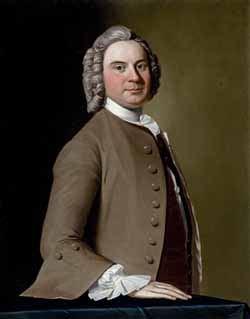On the one hand, he cared most about his business and trimmed his politics accordingly. Gov. Thomas Hutchinson suspected him of being behind all sorts of nefarious deals, but the local crowd considered him “a great Tory.”
I suspect Rowe also liked being liked, “trimming” to play to his current audience. During the big public meetings on the ships full of East India Company tea, he made an offhand remark about mixing tea with saltwater. That got him applause, and the crowd believed he’d come over to the radicals. Privately Rowe was upset, but he didn’t try to clarify his stance.
In those same months Rowe was spearheading a complex and costly effort to import and install Boston’s first street lamps. He seems to have long hoped to be elected to public office, and here he was visibly serving the public. How long could he keep that up?
On 10 May 1774, the same day Boston reelected its representatives to the Massachusetts General Court, the town received the first shocking news of the new law. Rowe went back to that day’s diary entry to add: “The Harmony Capt. Shayler arrived from London & brings the Severest Act ever was Penned against the Town of Boston.”
Three days later, with the news confirmed, Rowe lamented the “Late Act of Parliament for Blocking up the Harbour of Boston which is & will be a Great Evill.”
On that day, Boston called a sudden town meeting, ultimately choosing a committee to recommend what to do. The citizens put Rowe on that committee. In fact, he was the second man named, right after Samuel Adams.
This committee of eleven included gentlemen from various groups:
- radical Whigs: Dr. Joseph Warren, William Molineux, along with Adams.
- more centrist politicians: Thomas Cushing, William Phillips, Henderson Inches.
- lawyers: John Adams, Josiah Quincy, Jr.
- merchants: Thomas Boylston, Nathaniel Appleton, and Rowe.
To his credit, Rowe actually participated in the committee discussions. On 14 May he “Spent most part of the Day with the Town Committee at the Representatives Room” inside the Town House and then went back on 16 May. Boylston and Appleton didn’t attend either of those meetings, so Rowe was the merchants’ voice.
Not that the discussions was productive. On 18 May, the committee reported back to the town that they had received “several Proposals & plans” but hadn’t had time to digest them. The ongoing meeting pushed them to hurry and come up with solutions.
Rowe never recorded attending any more of those committee discussions. Instead, he began to pay more attention to other sources of authority in town. As I wrote back here, he declined an invitation to chair the town meeting, and expressed deep disagreement with it—privately, of course.
TOMORROW: Here comes the general.

No comments:
Post a Comment